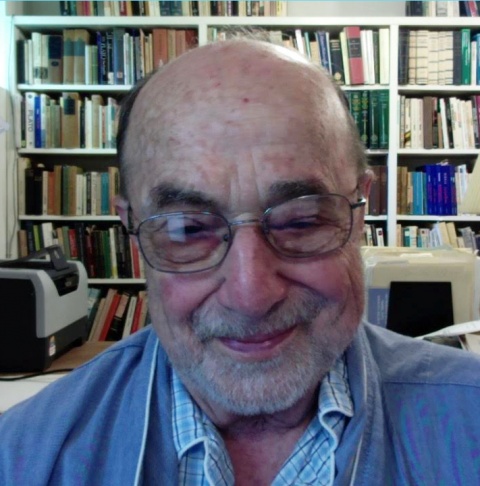Columbia College | Columbia University in the City of New York
Take Five with David Kettler ’51, GSAS’60

What were you like when you arrived at Columbia?
I was a lower-middle-class kid from Jersey City whose high school had been so unrewarding that I left at the beginning of the fourth year, withdrew the $500 I’d saved for college from years of part-time and summer employment and took an “accelerated” half-year program of preparation for high school equivalency examinations. This early completion let me take on a day job at Swift & Co. meatpackers in Jersey City as an internal messenger, as well as an evening and weekend job in a drugstore that together let me recoup my first-year college fees. I was a member of a small clique of adolescent boys who scorned our contemporaries, faked our ages at out-of-town dances (and occasional liquor stores) and talked about Freud. I gained admission to the College because I had read drugstore lending library books without end, which did not endear me to teachers but built up a powerful vocabulary.
For biographical context, I was born a Jewish child in Leipzig, Germany. Unlike dozens of aunts, uncles and cousins who died in the camps, my parents, brother and I had the great luck to gain admission to the U.S. in 1940, sailing on the last Italian Line peacetime ship from Genoa to New York.
What do you remember about your first-year living situation?
Arriving in fall 1948, I was much more observer than participant in student matters (except for a single football season playing my old trombone as poorly as ever), very happy and cooperative in classes, and commuting from the two-bedroom step-fatherly apartment “over the store” in the Greenville section of Jersey City to 116th Street, and then back to my evening jobs on Journal Square. At home, I no longer shared a double bed with my older brother because he’d been drafted into the Army, and I did schoolwork in the kitchen, listening to the 1280 Club jazz radio and CCNY basketball games. Neither my mother nor my stepfather had the slightest idea of what I was doing or why.
What class do you most remember and why?
That is a hard question because I remained a fond and reasonably industrious student in all but a few classes. There were Charles Frankel [’37, GSAS’46]’s CC and social philosophy classes and one or two of the Humanities classes early on. Later, there were rewarding history, government and economics classes and, most consequentially, John B. Stewart [GSAS’53]’s year-long course on the history of political theory, which initiated a lifelong professional interest. Moses Hadas [GSAS’30] was magical on ancient historians: He would jump from his chair and scribble across the board — in Greek, Latin, Hebrew — with the most contagious enthusiasm. Mark Van Doren [GSAS’21] on Don Quixote and Kafka’s Metamorphosis was wonderful; and we laughed at Irwin Edman [Class of 1916, GSAS1920]’s mannered displays but we learned from him. Nuts and bolts classes were taught by young, deeply invested faculty — all male, of course, at the time, and all white. Even Jews were still rare in junior ranks. But I never noticed. I sneaked an “honors” degree, although I never really completed my attempt to master Karl Marx’s German Ideology. I went on to graduate school after three years, having acquired enough A-minus grades and “maturity credits” to move on a year early.
Did you have a favorite spot on campus, and what did you like about it?
It seems absurd, but my favorite “spot” was the walk from Fayerweather to Hamilton, which I first learned to enjoy by walking three times weekly with John Stewart after his theory class during my third year. I was on that walk one autumn day when the peanut vendor’s radio blared, “The Giants win the pennant! The Giants win the pennant!” Having spent my adolescence within 10 blocks of Roosevelt Stadium, home of the Giants’ Jersey City AAA farm team, I was delighted, although I had not followed baseball during my college years. Closer to Broadway, I had a view of the Low Library steps and Alma Mater when I took part in assorted left-wing picket lines, mostly to do with protests against assorted politicians awarded honorary degrees, and then, later, in advertising for a Young Progressives’ “Negro History” lecture series for which I was publicist.
What, if anything, about your College experience would you do over?
I honestly believe that I had too little time and too much good luck to make substantially different choices, even in retrospect. I quickly discovered my interest and pursued it, and Columbia provided what I needed and wanted. The quick but endlessly voluble drugstore lunches with friends provided exactly what I wanted from student life. I was a kid, but I was also prematurely grown up.
More “Take Five”
- 1 of 32
- ›

